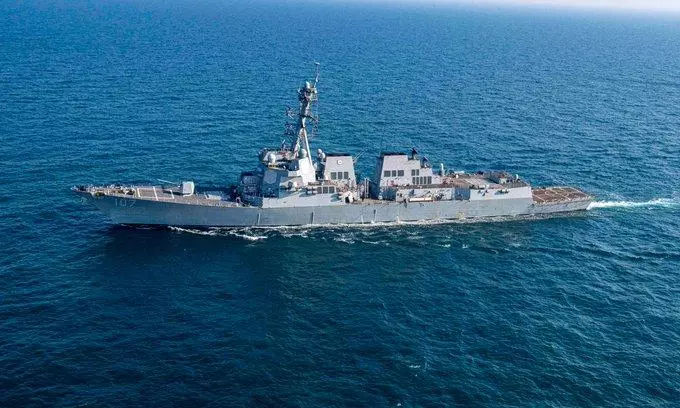U.S., allies warn Houthis, call for immediate end to Red Sea attacks
Freight rates nearly double but carriers have capacity to address diversions & longer voyages compared to pandemic yrs

The United States and its allies - Australia, Bahrain, Belgium, Canada, Denmark, Germany, Italy, Japan, Netherlands, New Zealand, Singapore, and the United Kingdom - have warned Houthis that they will bear the responsibility of the consequences should they continue to threaten lives, the global economy, and free flow of commerce in the region’s critical waterways.
"We remain committed to the international rules-based order and are determined to hold malign actors accountable for unlawful seizures and attacks," says a joint statement issued by the governments.
"Ongoing Houthi attacks in the Red Sea are illegal, unacceptable, and profoundly destabilising. There is no lawful justification for intentionally targeting civilian shipping and naval vessels. Attacks on vessels, including commercial vessels, using unmanned aerial vehicles, small boats, and missiles, including the first use of anti-ship ballistic missiles against such vessels, are a direct threat to the freedom of navigation that serves as the bedrock of global trade in one of the world’s most critical waterways.
"These attacks threaten innocent lives from all over the world and constitute a significant international problem that demands collective action. Nearly 15 percent of global seaborne trade passes through the Red Sea, including eight percent of global grain trade, 12 percent of seaborne-traded oil and eight percent of the world’s liquefied natural gas trade. International shipping companies continue to reroute their vessels around the Cape of Good Hope, adding significant cost and weeks of delay to the delivery of goods, and ultimately jeopardising the movement of critical food, fuel, and humanitarian assistance throughout the world.
"Let our message now be clear: we call for the immediate end of these illegal attacks and release of unlawfully detained vessels and crews."
Houthis continue attacks
The U.S. Central Command had earlier posted on X that "Iranian-backed Houthis fired two anti-ship ballistic missiles from Houthi controlled areas in Yemen into the Southern Red Sea. Multiple commercial ships in the area reported the impact of the ASBMs into the surrounding water though none have reported any damage."
Danish carrier Maersk has decided to pause all transits through the Red Sea/Gulf of Aden till further notice following multiple attacks on Maersk Hangzhou by Houthis in the Red Sea last week. The U.S. Navy had shot down three small boats killing all rebels on the boats.
Rates zoom on rerouting, attacks
Asia - N. Europe rates have increased 173 percent compared to just before the diversion announcements, to more than $4,000/FEU, according to the latest update from Freightos. "Asia-Mediterranean prices have doubled to more than $5,000/FEU. These rates are more than double the prices in January 2019."
CMA CGM announced Asia-Mediterranean rates will increase to more than $6,000/FEU on January 15, the update added. "Carriers have also announced surcharges ranging from $500 to as much as $2,700 per container which could push the all-in prices paid by shippers even higher."
With surcharges, if all-in prices reach the $5k-$8k per container range for these major ex-Asia tradelanes, those rate levels would be 2.5 to 4 times above normal levels for this time of year, the update added.
"Carriers have available capacity to address diversions and longer voyages compared to the pandemic years. The additional costs and capacity taken up by the longer transits are pushing rates up significantly but even at $5,000-$8,000/FEU, Asia-N. Europe and Mediterranean prices would be 45-65 percent lower than their $14k/FEU pandemic peak in late 2021 and 65-75 percent lower compared to the Asia-N. America East Coast peak of $22k/FEU."
Turbulent year ahead..or is it?
A month ago almost no one was prepping their contingency plans for shipments redirected around Africa, writes Lars Jensen in his LinkedIn post.
Jason Miller, Interim Chairperson, Department of Supply Chain Management, Michigan State University's Eli Broad College of Business says: "If you are a U.S. firm that is importing by container from India, chances are your imports come in through New York, Savannah or Norfolk based on Census Bureau data. This raises the question: from a safety stock standpoint, are you better off using a carrier that is routing 100 percent of vessels around the Red Sea via the Cape of Good Hope (and adding ~8 days of transit time to what would usually be a ~26 day trip) versus a carrier that is rolling the dice about going through the Red Sea and may have some vessels either pause or have to divert to go around Africa (resulting in an even longer trip than with a planned Cape of Good Hope route)? Looking at some rough calculations using the most complete conventional formula for setting safety stock, the answer is direct routing around Africa is the better scenario for fast-moving ‘A’ items."

Jyothi Shankaran
Associate Editor, STAT Media Group. He has worked with IndiaSpend, Bloomberg TV, Business Standard and Indian Express Group. Jyothi can be reached at jyothi@statmediagroup.com


